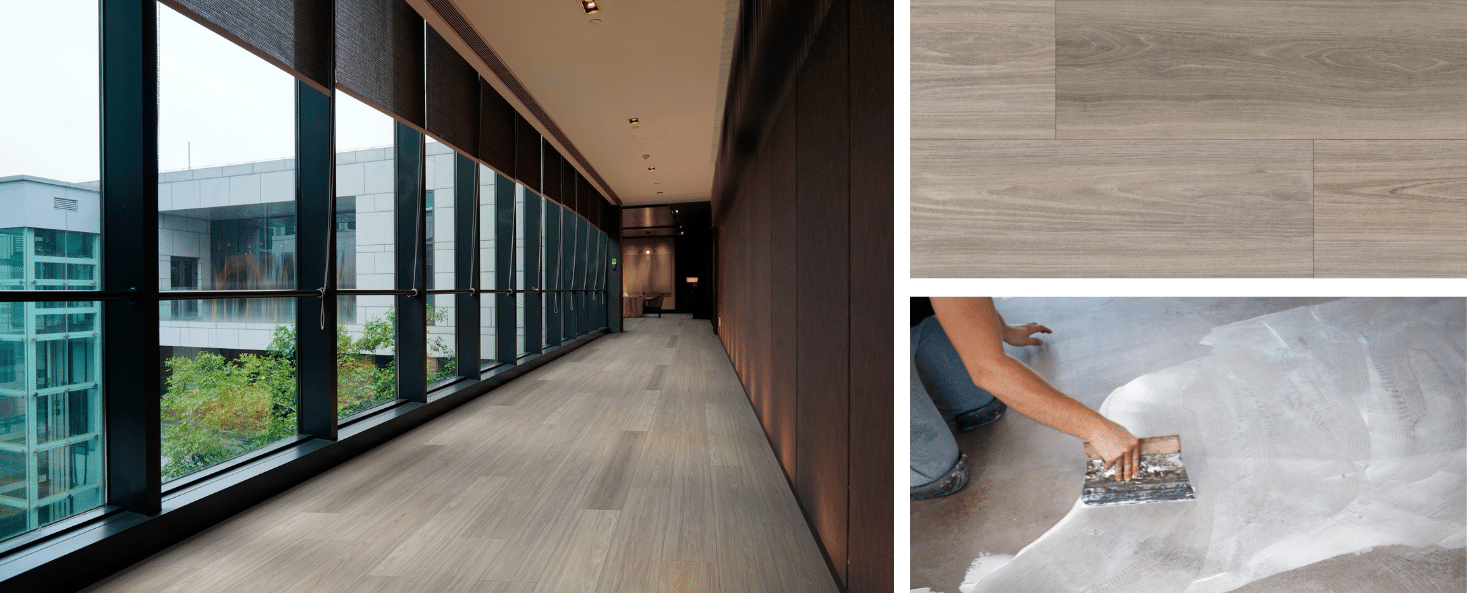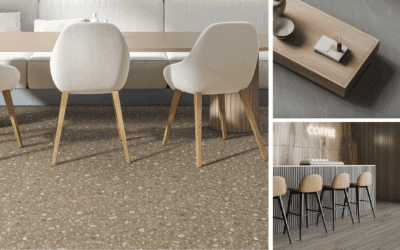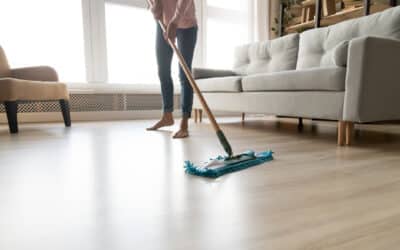A professionally installed glue-down vinyl plank floor is extremely hard-wearing and resembles real wood or stone.
Homeowners, landlords, and business owners choose glue-down vinyl plank flooring for its competitive price, style, utility, and dimensional stability.
It’s a practical solution for kitchens, bathrooms, main rooms, basements, and more.
In this buyer’s guide, you will learn…
- Why and when to install glue-down vinyl plank flooring
- The potential problems with glue down vinyl plank flooring and how to avoid them
- The best specialty brands available (with price and product comparisons)
- How glue-down compares to floating/click-lock vinyl
By the end, you will know…
- Whether or not glue-down vinyl plank is the right choice for your project
- If glue-down installation is something you can do yourself
- How to ensure a professional install protected under warranty
- How specialty brands like Happy Feet, Shaw, and COREtec compare across the board
Glue Down Vinyl Plank Flooring
Glue-down vinyl flooring is an excellent choice for a durable and attractive floor at an affordable price. Glue-down vinyl adheres to the subfloor, which secures it firmly in place.
This means you will have a solid, stable surface that stands up well to high foot traffic.
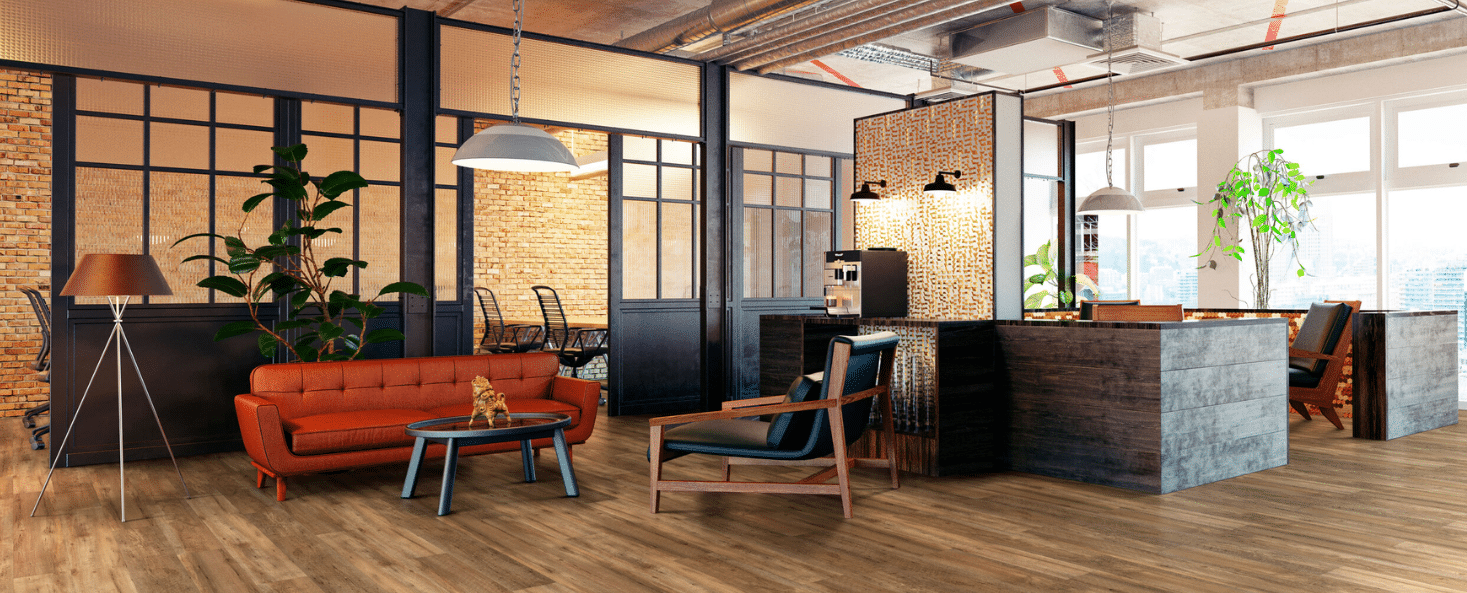
Do you have guests or family members over for parties or events?
Glue-down plank vinyl flooring will hold up great over time. Walk and dance on it all you want – it won’t separate.
Have a basement with a billiards table? Glue-down vinyl plank will support heavy furniture that could damage the locking system of a click-lock floating floor.
Or do you have a retail space or apartment complex and looking for a resilient modern floor?
When you need the most durable and stable vinyl option, glue-down is your best choice.
Problems with Glue-Down Vinyl Plank Flooring
Like all floors, a glue-down vinyl plank floor comes with the potential for problems. You can prevent them by following the installation instructions.
A glue-down vinyl floor that’s properly installed and cared for will look and perform in a predictable way. A reputable manufacturer guarantees it.
But ignoring the procedures outlined in the manufacturer’s installation instructions increases the risk that something will go wrong.
Worst of all, you will void the warranty.
Search online and you will find people upset about their glue-down vinyl plank floors. They’re unhappy and looking for answers. And they suspect that the product and installation method itself is to blame.
No manufacturer is perfect, and occasionally they deliver a faulty product. Plus there’s many cheap, low-performing glue-down options available on the market today that don’t live up to their promises.
However, if you’re experiencing problems with a specialty product, it’s likely the installation is to blame.
Follow the Manufacturer’s Installation Instructions: A Cautionary Tale
Watch “GAPPING PLANKS! Glue Down Vinyl WARNING, Shrinking and Gapping – Telling 4 Year Review!” on Youtube. The creator of the channel is a knowledgeable builder, but in this video he misses the mark.
In the video he explains that four years ago he had Mannington ADURA Max 5mm vinyl plank flooring installed in his kitchen and family room.
He shows how after four years, his floor now has gaps that are thicker than dimes and quarters. Then he explains how a glue-down vinyl floor with gaps will drive you crazy because they become small traps for crumbs and dirt.
Not only are the gaps an eyesore, but they also collect any debris that falls into them, which gets stuck to the glue. It’s really a chore to clean them out.
Overall, he’s very disappointed in the look and performance of the floor. He concludes that sunlight probably caused shrinking and expansion, resulting in the gaps.
At the end of the video, he tells his audience that he would not recommend glue-down vinyl plank flooring.
Read through the installation instructions and the warranty for ADURA Max though, and you will see that the flooring is loose lay floating. It’s designed specifically for angle/angle install only.
Mannington provides a lifetime residential warranty for ADURA Max, but you will void the warranty if you use glue.
Glue-down flooring isn’t to blame, but the installer who didn’t follow directions.
Installers Who Don’t Follow the Installation Instructions
Yes, some installers recommend gluing 5mm loose lay LVP residentially and commercially. These installers choose products with dimensional stability of .002” – .004” and apply a specific high-quality adhesive to keep the planks in place.
You may be in a situation where your installer recommends installing the floor in a way that voids the warranty. They may come to you highly recommended and be very skilled.
What do you do in this situation? They have been doing it for years. They’re experts. In the end, it’s your call, but why take the risk?
You can avoid problems by maintaining the warranty and following the installation guidelines.
Installing Glue Down Vinyl Plank Flooring
Installing vinyl plank flooring is a project you can do yourself, but glue-down vinyl requires more work. You have to trowel the adhesive onto the subfloor and carefully lay planks in a straight line. This is doable but more difficult than laying a floating floor.
When installing glue-down vinyl plank flooring, you must be familiar with the product’s installation guide and warranty. You really need to know the details and the process to prevent surprises later.
Proper installation is crucial. A poor installation will leave you with a mediocre floor that reminds you of its flaws every day.
Reading through the warranty and installation guide shows you exactly what the manufacturer outlines for optimal results.
It also shows you the documentation required throughout the installation to maintain the warranty. A floor is a big investment, and a good installer checks all the bases before, during, and after.
The Difference Between Glue-Down Products
Be careful not to make assumptions about a particular product based on its installation type. Just because you have two different glue-down products doesn’t mean that you will install them in exactly the same way.
There will be similarities, but there will likely be differences, such as with acclimation and the recommended adhesive. With all Happy Feet glue-down products, for instance, using a different adhesive than H9100 or HF9200 will void your warranty.
See the chart below comparing the installation instructions of COREtec, Shaw, and Happy Feet glue-down products.
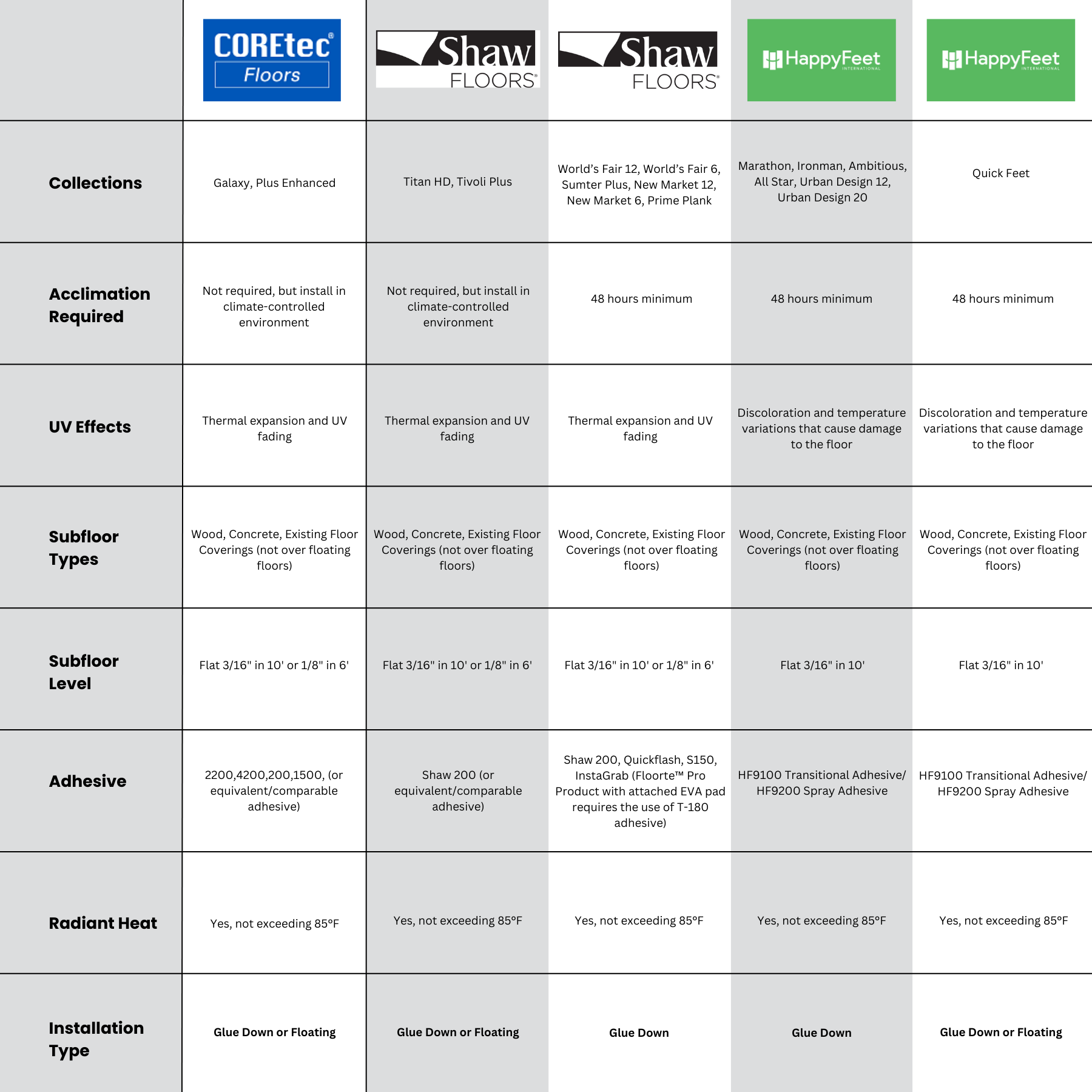
Glue Down LVP Flooring Vs. Floating LVP Flooring
Glue-down floors require an adhesive that bonds the planks to the subfloor. Click-lock or loose lay floating floors do not need to be secured to the subfloor.
Some products are both floating and glue-down.
Here’s a list of pros and cons to show you how these two types of vinyl compare.
Pros of Glue-Down Vinyl Plank
- Easy to replace damaged individual planks. You can pull up a single plank and put a new one in. The difficulty depends on your skill and the type of adhesive used (pressure sensitive or hard set).
- Greater dimensional stability. A floor set in place with adhesive will stay in place, even with frequent foot traffic. This is why more people choose it for commercial and light commercial projects.
- The product is less expensive per sq. ft. Glue down vinyl plank flooring products are often less expensive than floating floors because there’s less material.
- Better on uneven subfloors. We recommend following the manufacturer’s guidelines exactly for preparing the subfloor prior to installation. However, you may not have that option. In that case, glue-down will adhere better to an uneven subfloor whereas click-lock and floating will have soft spots in unlevel areas.
- 100% Waterproof.
- Easy to clean and maintain using a vinyl mop and the best vinyl floor cleaner
Cons of Glue-Down Vinyl Plank
- More difficult installation process. Glue-down requires adhesive, so it’s more difficult to install than floating or click-lock.
- Imperfections in the subfloor can telegraph through. You are more likely to see flaws beneath the floor because the material is typically thinner than floating/click-lock.
- Harder underfoot. Glue-down vinyl is not as cushioned as floating/click-lock.
Pros of Floating/Click-Lock Vinyl Plank
- Faster install that’s very DIY-friendly. You can install a floating floor faster and easier than one that you have to glue down.
- A more cushioned feel underfoot. If you want a softer floor, then floating is the way to go.
- Easier to remove the entire floor. You can remove floating floors without much trouble, giving you the versatility to change out your floor.
- Easy to replace damaged planks (except click-lock). With loose lay floating floors, you can easily remove and replace a single plank. See the cons for doing this with click-lock floors.
- 100% Waterproof.
- Easy to clean and maintain using a vinyl mop and the best vinyl floor cleaner.
- A quieter product than glue-down vinyl plank. Floating floors tend to be thicker than glue-down products and some have backings engineered to deaden sound.
Cons of Floating/Click-Lock Vinyl Plank
- Less dimensional stability. A floating floor lacks the additional support of adhesive, so heavy foot traffic poses a greater threat to the floor.
- Locking system can break under too much pressure. If you have heavy furniture, you will put your floating floor at risk.
- More difficult to replace individual click-lock planks (click-lock). You need to replace an entire row or more of a floating, click-lock to replace a single plank due to the click-lock system.
The Best Glue Down Vinyl Plank Flooring
At Panel Town, we offer a wide range of specialty glue-down vinyl plank flooring products.
These brands provide high-quality products with excellent warranties.
To filter through other attributes of glue-down vinyl plank, such as color, shade, and look, you can browse our waterproof glue-down collections.
For the newest in glue-down flooring, see the latest collections from Happy Feet.
These products provide exceptional quality for residential and light commercial spaces at an excellent price.
Comparing 19 Glue-Down Vinyl Plank Floors
You can use this chart to compare specific products from COREtec, Shaw, and Happy Feet at a glance.
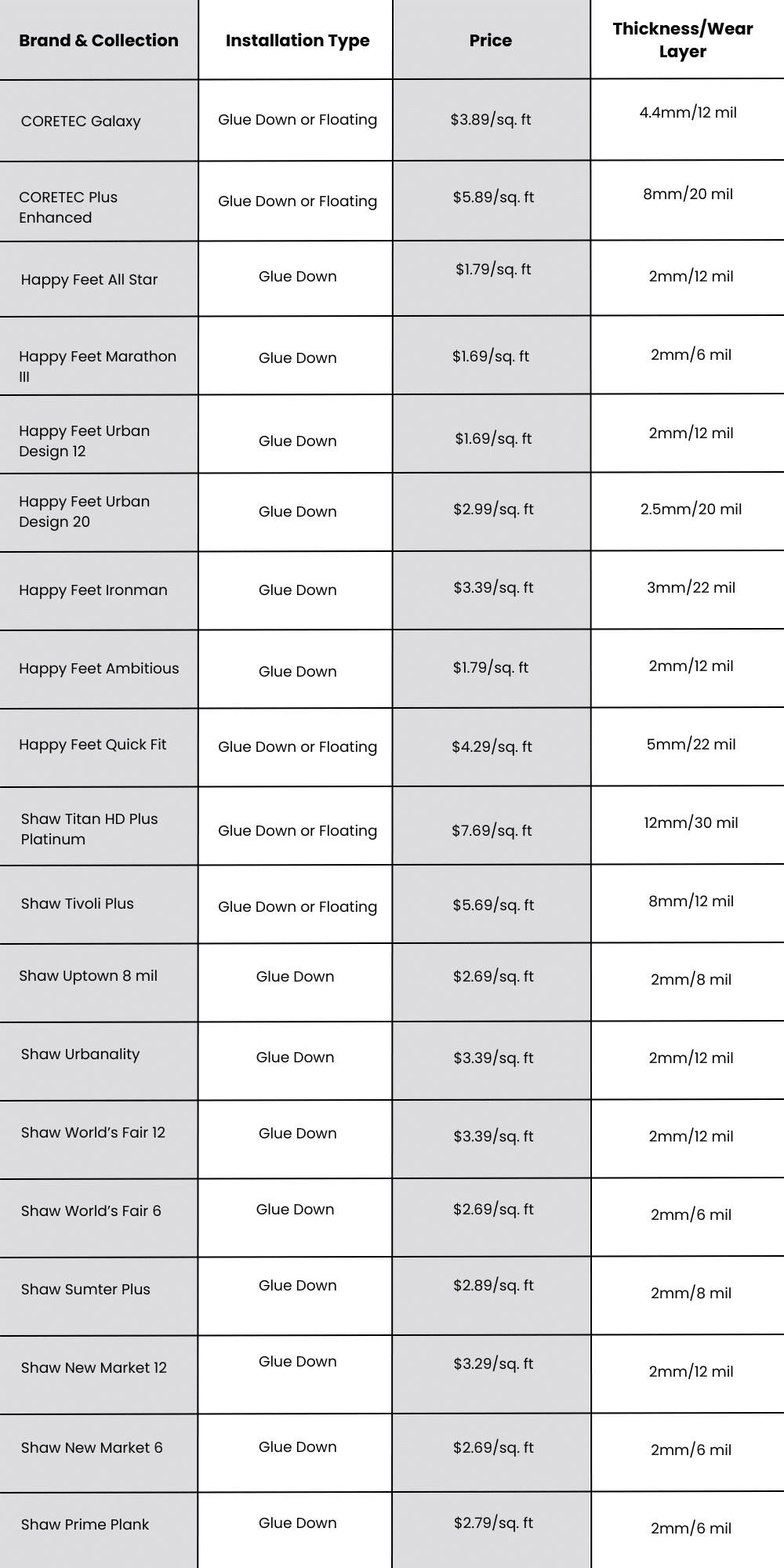
Summary
Glue-down vinyl plank flooring is a durable option suitable for high-traffic areas. Because of its dimensional stability, it can withstand constant foot traffic. For this reason, people frequently chose it for residential, commercial and light commercial projects.
This type of flooring adheres directly to a prepared subfloor with an adhesive, so there’s minimal movement. It’s also cost-effective, easy to maintain, hard-wearing, and waterproof.
For a perfectly installed floor, make sure that whoever installs the floor knows the manufacturer’s instructions and documentation requirements. In this way you will also maintain the warranty.
Compared to glue-down vinyl, floating loose lay/click-lock vinyl plank flooring is easier to install and more comfortable underfoot.You can also take apart the floor whenever necessary.
Additionally, floating products with specially engineered backings provide enhanced sound deadening qualities. However, click-lock vinyl locking systems can break beneath heavy furniture. They’re also more challenging when only a single plank needs replacement, often requiring the disassembly of adjacent rows.
Panel Town provides an array of specialty glue-down vinyl plank flooring products that you won’t find in the big box stores. We offer a wide array of top-tier options from brands like Happy Feet, COREtec, and Shaw.
Ultimately, the decision between glue-down and floating vinyl plank flooring hinges on the specifics of your project. Before you choose glue-down vinyl plank, consider the traffic, stability requirements, subfloor conditions, and your preference.
Want to learn more about vinyl flooring? Read about vinyl flooring thickness.
